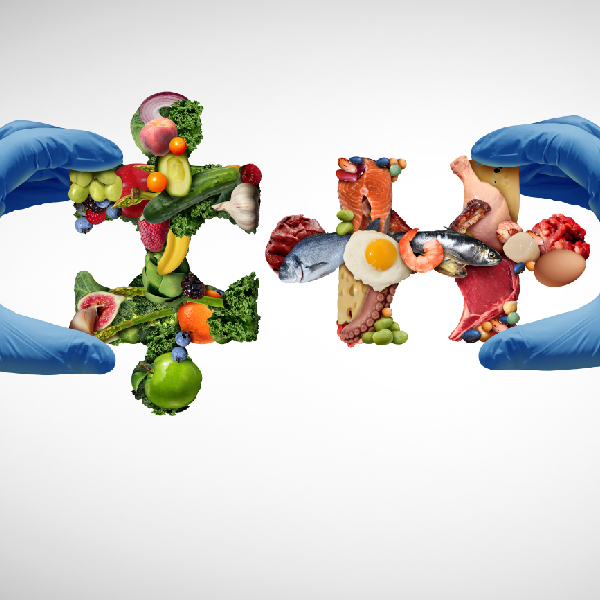Micronutrients and macronutrients work together, so it is important to make sure you are meeting your daily recommended allowance for each.
If you’ve spent any time in a gym working out recently or shopping in the produce section of your local grocery store or co-op you may have heard people talking about “counting macros” or “counting micros,” only to wonder what micros and macros are and why are so many people counting them. If so, you are not alone. As we are becoming more and more conscious of the foods we eat, there is a developing trend in counting the number of micronutrients and macronutrients as part of a weight loss or weight maintenance regimen. But what exactly are these “micros” and “macros” that have so many of us reaching for our calculators as we plan our grocery lists and weekly meals?
What are Micronutrients?
Micronutrients are vitamins and minerals that our bodies require for optimal health. Examples of micronutrients include vitamins A, B, C, D, E, and K, as well as minerals such as calcium, iron, magnesium, and zinc. Our body requires smaller amounts of micronutrients, essential vitamins and minerals that are important for brain function, digestion and hormone production.
Overview of Vitamins
Vitamins are either fat soluble or water soluble. Fat soluble vitamins include vitamins A, D, E, and K. They are dissolved in fat and stored in our bodies for longer stretches of time. Water soluble vitamins, as their name suggests, are dissolved in water. Water soluble vitamins include B vitamins such as B1 – B3; B5 – B7; B9 and B12. Vitamins and minerals are measured in milligrams (mg), micrograms (mcg), or International Units (IU). If you’ve ever purchased vitamins at the pharmacy, you’ve likely seen these measures on the bottle’s label.
The number of micronutrients needed each day will vary based on your age and gender. The Dietary Guidelines for Americans is a good resource to help you determine your recommended daily intake of vitamins and minerals. Offered below is an overview of each vitamin, its function and food source.
| Vitamin | Function | Food Source |
| A | Helps maintain healthy skin, vision, and it keeps our immune system working properly. | Carrots, Eggs, Sweet Potatoes |
| C | Vital to our body’s healing process. Helps protect our cells against the effects of free radicals. It’s needed to form blood vessels, cartilage, muscle and collagen in bones. | Citrus Fruits, Berries, Potatoes, Tomatoes, Peppers, Cabbage, Brussels Sprouts, Broccoli, Spinach |
| D | Helps us absorb calcium and promotes bone health. It also helps keep our immune system working. | Egg yolks, Dairy, Salmon (and sunshine) |
| E | Helps protect us from free radicals. Free radicals can cause cell damage and are implicated in aging. Vitamin E is also important for our immune systems and for skin and vision health. | Broccoli, Spinach, Nuts and Seeds |
| K | Helps with blood clotting and regulating calcium. | Brussel Sprouts, Broccoli, Kale and Spinach |
| B-vitamins | Help break down carbohydrates, fats, and proteins. B-vitamins also support new cell growth. | |
| B1, B6, B9, B12 | Help keep our nervous system functioning | Peas, Nuts, Whole Grains (B1); Pork, Poultry, Peanuts (B6); Broccoli, Brussel Sprouts, Kale, Spinach (B9); Eggs, Fish, Cheese (B12) |
| B6, B9, B12 | Help produce red blood cells. They also help regulate our mood and reduce our risk of anemia and can help with cardiovascular health. |
What are Macronutrients?
Macronutrients are needed in larger quantities. Macronutrients are carbohydrates, fat and protein. The Dietary Guidelines for Americans offers guidance on macronutrients. Like micronutrients, the number of macronutrients needed each day will be determined by your age and gender. Your daily macros will also be determined by your specific weight loss goals, so be sur to talk with your health care provider before altering your diet.
Carbohydrates. Carbohydrates are an energy source. They turn into sugar (glucose) and promote digestion and satiety. Examples of carbohydrates are bread, starchy vegetables, beans, milk, and fruit. Not all carbs are created equal, so it’s important to consume:
- Whole grains like quinoa, brown rice, or whole oats;
- Whole fruits or vegetables;
- Legumes like beans, lentils, or chickpeas.
Fat. Eat healthy fats like nuts and seeds, avocados, olive oil, edamame, or fish.
Protein. Protein is important because it builds and maintain muscle, which is metabolically active. Eat healthy proteins like lean beef, poultry, fish, tofu, or Greek yogurt.
The Role of Micronutrients and Macronutrients in Weight Loss
During active weight loss or weight maintenance, it is important to ensure your body is getting all the vitamins, minerals and nutrient-dense foods it needs for optimal functioning. Micronutrients and macronutrients work together, so it is important to make sure you are meeting your daily recommended allowance for each. Following a balanced, nutrient-dense diet by paying attention to your micro- and macronutrient intake can help you with your weight loss goals.
Before starting any change in diet or exercise program be sure to consult with your health care provider to determine the changes that are best for you.
About the Author: Dr. Dawn M. Sweet has over 20 years of experience in the field of communication. Sweet has given several invited talks to and workshops for academic and private sector audiences on the role of nonverbal and verbal communication in achieving positive outcomes and mitigating bias. Her research has been published in several top ranked peer-review journals, and it has been featured on NPR’s River to River / All Things Considered, Buzzfeed, and Science Daily. Her research has also been used to inform expert testimony.
The information provided on this platform is intended for informational purposes only. It is not a substitute for professional medical advice, diagnosis, or treatment. Always seek the advice of your physician or other qualified health provider with any questions you may have regarding a medical condition. Never disregard professional medical advice or delay in seeking it because of something you have read on this platform. Furthermore, the information provided here has not been reviewed or approved by a health care professional. Any reliance you place on such information is strictly at your own risk. We do not endorse or guarantee the accuracy, completeness, or usefulness of any information provided. It’s important to consult with a qualified health care professional before making any changes to your diet, exercise, medication, or treatment regimen. Reliance on any information provided on this platform is solely at your own risk.





